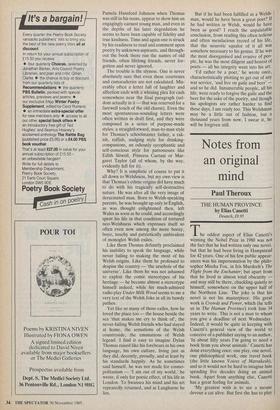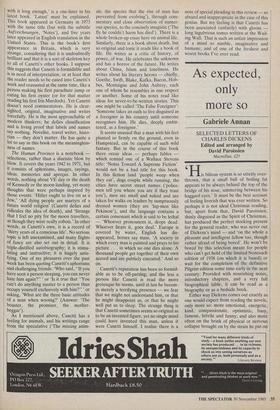Notes from an original mind
Paul Theroux
THE HUMAN PROVINCE by Elias Canetti
Deutsch, £9.95
The oddest aspect of Elias Canetti's winning the Nobel Prize in 1980 was not the fact that he had written only one novel, but that he had been living in Hampstead for 42 years. One of his few public appear- ances was his impersonation by the philo- sopher Mischa Fox, in Iris Murdoch's The Flight from the Enchanter; but apart from that he lived in almost total obscurity — and may still be there, chuckling quietly to himself, somewhere on the upper half of the Northern Line. The joke is that his novel is not his masterpiece. His great work is Crowds and Power, which (he tells us in The Human Province) took him 34 years to write. This is not a man to whom you give a deadline of next Wednesday. Indeed, it would be quite in keeping with Canetti's general view of the world to conceive of a publisher saying to an author, 'In about fifty years I'm going to need a book from you about animals.' Canetti has done everything once: one play, one novel, one philosophical work, one travel book (the little known Voices of Marrakesh), and so it would not be hard to imagine him spending five decades doing an animal book. Apart from anything else, Canetti has a great feeling for animals.
'My greatest wish is to see a mouse devour a cat alive. But first she has to play with it long enough,' is a one-liner in his latest book. 'Latest' must be explained. This book appeared in Germany in 1973 with the same title (but with the subtitle Aufzeichnungen, 'Notes), and five years later appeared in English translation in the United States. This is the book's first appearance in Britain, which is very strange, considering that it is undoubtedly brilliant and that it is a sort of skeleton key to all of Canetti's other books. I suppose this suggests that Canetti is formidable and Is in need of interpretation, or at least that the reader needs to be eased into Canetti's work and reassured at the same time, like a person making his first parachute jump or eating his first oyster (or for that matter reading his first Iris Murdoch). Yet Canetti doesn't need commentators. He is clear- sighted, original, imaginative and writes forcefully. He is the most approachable of modern thinkers; he defies classification and is living proof that labels and names say nothing. Novelist, travel writer, histo- nan — they don't matter. He has quite a lot to say in this book on the meaningless- ness of names.
The Human Province is a notebook — selections, rather than a diaristic blow by blow. It covers the years 1942 to 1971, but it consists of aphorisms, images, sayings, Ideas, memories and apergus. In other words, nothing about VE day or the death of Kennedy or the moon landing, yet many thoughts that were perhaps inspired by those events: `Hitler ought to live on as a Jew,' All dying people are martyrs of a future world religion' (Canetti defies and ridicules the idea of death), and 'Strange that I feel no pity for the moon travellers, as though they were really robots.' In other words, in Canetti's own, it is a record of 'thirty years of a conscious life'. No serious topic is left unexamined, and many flights of fancy are also set out in detail. It IS triple-distilled autobiography; it is stimu- lating and instructive; it is hugely satis- fying. One of my pleasures over the past week has been quoting Canetti's aphorisms and challenging friends: 'Who said, "If you have seen a person sleeping, you can never hate him again?" ' or `Is it true that "You can't do anything nastier to a person than occupy yourself exclusively with him?" or asking, 'What are the three basic attitudes of a man when wooing?' (Answer: The boaster, the promiser, the mother- beggar').
As I mentioned above, Canetti has a feeling for animals, and his writings range from the speculative (The missing anim- als: the species that the rise of man has prevented from evolving'), through com- mentary and close observation of numer- ous species, to the concisely imagistic (The fly he couldn't harm has died'). There is a whole broken-up essay here on animal life. Similarly, there is a book about death, but so original and tonic it reads like a book of life. He writes as a critic of history, of power, of war. He celebrates the unknown and has a horror of the future. He writes about China, Islam and loneliness. He writes about his literary heroes — chiefly, Goethe, Swift, Blake, Kafka, Bacon, Hob- bes, Montaigne and John Aubrey, each one of whom he resembles in one respect or another. Some of his notes read like ideas for never-to-be-written stories. This one might be called The False Foreigner': `Someone takes an oath to live disguised as a foreigner in his country until someone recognises him. He dies, deeply embit- tered, as a foreigner.'
It seems unusual that a man with his feet planted so firmly on the ground, even in Hampstead, can be capable of such wild fantasy. But in the course of this book there occur ideas — perhaps fables — which remind one of a Wallace Stevens title: `Notes Toward A Supreme Fiction' would not be a bad title for this book. In this fiction land 'people weep when they eat', dogs couple while running, the cities have secret street names ('police- men tell you where you are if they trust you'), men are small and naked and are taken for walks on leashes by sumptuously dressed women (they are lap-men like Pekinese'), and the language contains a certain consonant which is said to be lethal — 'Whoever pronounces it, drops dead. Whoever hears it, goes deaf.' Europe is covered by water, English has dis- appeared, horses say mass. 'A society in which every man is painted and prays to his picture . . . in which no one dies alone. A thousand people get together of their own accord and are publicly executed.' And so on.
Canetti's reputation has been so formid- able as to be off-putting; and the less a person like Canetti is read the more grotesque he seems, until at last he becom- es merely a terrifying presence — we fear that we might not understand him, or that he might disappoint us, or that he might well put us to sleep. The strange thing is that Canetti sometimes seems so original as to be an invented figure, yet no single mind could have invented this man, unless it were Canetti himself. I realise there is a note of special pleading in this review — so absurd and inappropriate in the case of this genius. But my feeling is that Canetti has been associated (unfairly) with gloom — long lugubrious tomes written at the Wail- ing Wall. That is such an unfair impression of a mind so nimble, imaginative and humane; and of one of the freshest and wisest books I've ever read.



























































 Previous page
Previous page